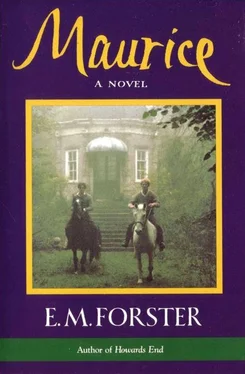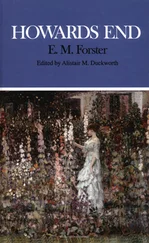Maurice had seen a poem to himself. Conscious that life grew daily more amazing, he said nothing. Was he the same man who eight months back had been puzzled by Risley? What had deepened his vision? Section after section the armies of humanity were coming alive. Alive, but slightly absurd; they misunderstood him so utterly: they exposed their weakness when they thought themselves most acute. He could not help smiling.
"You evidently have. " Then suddenly^ "Mr Hall, is there anyone? Some Newnham girl? Pippa declares there is."
"Pippa had better ask then," Maurice replied.
Mrs Durham was impressed. He had met one impertinence with another. Who would have expected such skill in a young man? He seemed even indifferent to his victory, and was smiling to one of the other guests, who approached over the lawn to tea. In the tones that she reserved for an equal she said, "Impress on him about America anyhow. He needs reality. I noticed that last year."
Maurice duly impressed, when they were riding through the glades alone.
"I thought you were going down," was Clive's comment. "Like them. They wouldn't look at Joey." Clive was in full reaction against his family, he hated the worldliness that they combined with complete ignorance of the World. "These children will be a nuisance," he remarked during a canter.
"What children?"
"Mine! The need of an heir for Penge. My mother calls it marriage, but that was all she was thinking of."
Maurice was silent. It had not occurred to him before that neither he nor his friend would leave life behind them.
"I shall be worried eternally. They've always some girl staying in the house as it is."
"Just go on growing old —"
"Eh, boy?"
"Nothing," said Maurice, and reined up. An immense sadness — he believed himself beyond such irritants — had risen up in his soul. He and the beloved would vanish utterly — would continue neither in Heaven nor on Earth. They had won past the conventions, but Nature still faced them, saying with even voice, "Very well, you are thus; I blame none of my children. But you must go the way of all sterility." The thought that he was sterile weighed on the young man with a sudden shame. His mother or Mrs Durham might lack mind or heart, but they had done visible work; they had handed on the torch their sons would tread out.
He had meant not to trouble Clive, but out it all came as soon as they lay down in the fern. Clive did not agree. "Why children?" he asked. "Why always children? For love to end where it begins is far more beautiful, and Nature knows it."
"Yes, but if everyone —"
Clive pulled him back into themselves. He murmured something about Eternity in an hour: Maurice did not understand, but the voice soothed him.
18
During the next two years Maurice and Clive had as much happiness as men under that star can expect. They were affectionate and consistent by nature, and, thanks to Clive, extremely sensible. Clive knew that ecstasy cannot last, but can carve a channel for something lasting, and he contrived a relation that proved permanent. If Maurice made love it was Clive who preserved it, and caused its rivers to water the gar' den. He could not bear that one drop should be wasted, either in bitterness or in sentimentality, and as time went on they abstained from avowals ("we have said everything") and almost from caresses. Their happiness was to be together; they radiated something of their calm amongst others, and could take their place in society.
Clive had expanded in this direction ever since he had understood Greek. The love that Socrates bore Phaedo now lay within his reach, love passionate but temperate, such as only finer natures can understand, and he found in Maurice a nature that was not indeed fine, but charmingly willing. He led the beloved up a narrow and beautiful path, high above either abyss. It went on until the final darkness — he could see no other terror — and when that descended they would at all events have lived more fully than either saint or sensualist, and would have extracted to their utmost the nobility and sweetness of the world. He educated Maurice, or rather his spirit educated Maurice's spirit, for they themselves became equal. Neither thought "Am I led; am I leading?" Love had caught him out of triviality and Maurice out of bewilderment in order that two imperfect souls might touch perfection.
So they proceeded outwardly like other men. Society received them, as she receives thousands like them. Behind Society slumbered the Law. They had their last year at Cambridge together, they travelled in Italy. Then the prison house closed, but on both of them. Clive was working for the bar, Maurice harnessed to an office. They were together still.
19
By this time their families had become acquainted.
"They will never get on," they had agreed. "They belong to different sections of society." But, perhaps out of perversity, the families did get on, and Clive and Maurice found amusement in seeing them together. Both were misogynists, Clive especially. In the grip of their temperaments, they had not developed the imagination to do duty instead, and during their love women had become as remote as horses or cats; all that the creatures did seemed silly. When Kitty asked to hold Pippa's baby, when Mrs Durham and Mrs Hall visited the Royal Academy in unison, they saw a misfit in nature rather than in society, and gave wild explanations. There was nothing strange really: they themselves were sufficient cause. Their passion for each other was the strongest force in either family, and drew everything after it as a hidden current draws a boat. Mrs Hall and Mrs Durham came together because their sons were friends; "and now," said Mrs Hall, "we are friends too."
Maurice was present the day their "friendship" began. The matrons met in Pippa's London house. Pippa had married a Mr London, a coincidence that made a great impression on Kitty, who hoped she would not think of it and laugh during tea. Ada, as too silly for a first visit, had been left at home by Maurice's advice. Nothing happened. Then Pippa and her mother motored out to return the civility. He was in town but again nothing seemed to have happened, except that Pippa had praised Kitty's brains to Ada and Ada's beauty to Kitty, thus offending both girls, and Mrs Hall had warned Mrs Durham against installing hot air at Penge. Then they met again, and as far as he could see it was always like this; nothing, nothing, and still nothing.
Mrs Durham had of course her motives. She was looking out wives for Clive, and put down the Hall girls on her list. She had a theory one ought to cross breeds a bit, and Ada, though suburban, was healthy. No doubt the girl was a fool, but Mrs Durham did not propose to retire to the dower house in practice, whatever she might do in theory, and believed she could best manage Clive through his wife. Kitty had fewer qualifications. She was less foolish, less beautiful, and less rich. Ada would inherit the whole of her grandfather's fortune, which was considerable, and had always inherited his good humour. Mrs Durham met old Mr Grace once, and rather liked him.
Had she supposed the Halls were also planning she would have drawn back. Like Maurice they held her by their indifference. Mrs Hall was too idle to scheme, the girls too innocent. Mrs Durham regarded Ada as a favourable line and invited her to Penge. Only Pippa, into whose mind a breath of modernity had blown, began to think her brother's coldness odd. "Clive, are you going to marry?" she asked suddenly. But his reply, "No, do tell mother," dispelled her suspicions: it is the sort of reply a man who is going to marry would make.
No one worried Maurice. He had established his power at home, and his mother began to speak of him in the tones she had reserved for her husband. He was not only the son of the house, but more of a personage than had been expected. He kept the servants in order, understood the car, subscribed to this and not to that, tabooed certain of the girls' acquaintances. By twenty-three he was a promising suburban tyrant, whose rule was the stronger because it was fairly just and mild. Kitty protested, but she had no backing and no experience. In the end she had to say she was sorry and to receive a kiss. She was no match for this good-humoured and slightly hostile young man, and she failed to establish the advantage that his escapade at Cambridge had given her.
Читать дальше












